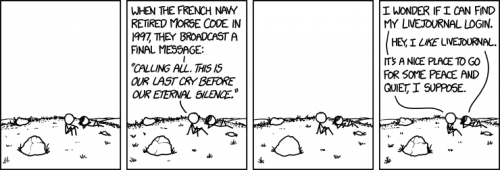Morse at one time was the mainstay of communication around the globe. From London to Sydney the dots and dashes were heard.
Then in the late 90s, it was decided that this method was old fashioned and with the increase of modern technology Morse was quietly dropped. It was out dated as if Morse was being sent by a ship then it was in dire trouble and the trouble would have been picked up before by modern methods.

This post was inspired by, yet another, XKCD cartoon that talked about when the French Navy retired Morse in 1997. Their last message was both inspirational and very morose at the same time.
It was broadcast to the world on January 31, 1997. The end of an era. A very sad end with very poetic last words
Calling all. This is our last cry before our eternal silence
Without that context, you could think it could have been a cry for help from a ship in distress. Fortunately, it wasn’t but a lot sadder in a way.
Two years later in 1999, July 12 to be precise, the United States Coast Guard signed off with Samuel Morse’s original 1844 message:
Not as poetic as what the French Navy sent but it does sound like it was a very emotive day.
The story of Morse is the story of the late 19th and the first half of the 20th centuries. A way to send messages around the world at the speed unsurpassed. You could get a message from London to New York within hours. Much quicker than any other method of the day.
Not only that, it was one of the first binary codes that was well known. A set of short, and long, beeps going through the air. Asking for anything. Sending congratulations, or considerations. Questions for a politician or orders for a general. it was all there in the dots and dashes.
Now all of that is gone. Well, almost. It is still being kept alive by radio amateurs. Now it’s just as a hobby and not as a method of sending information. It’s nice to see that some people are keeping the language alive even if the world’s governments are silent.








